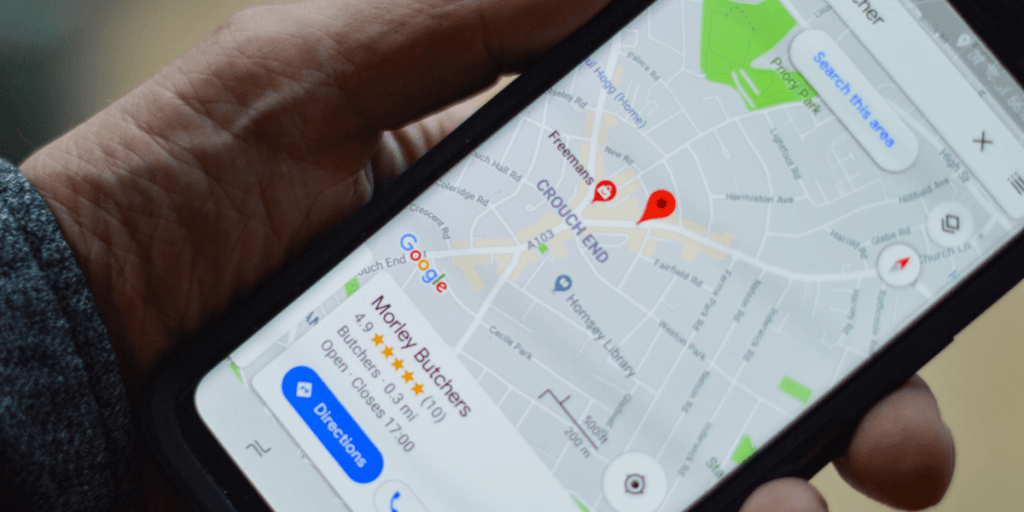Should I Include Local Search for Mobile in My Digital Marketing Strategy?
Local search is a great way to get more customers. It also plays a major factor in your digital marketing strategy, but you need a specialist to implement it. Search engine optimization is not a one-time process. It requires ongoing maintenance. To keep the rankings high enough, you need to deliver exactly what your target audience expects. If you are wondering why local search for mobile devices is essential, you should know that 46% of all searches on Google are seeking local information and 88% of consumers that search on a mobile device for a local business either call or visit the company within 24 hours.
We will discuss the importance of the local search for mobile, the latest trends, best practices, and more. Follow along for more in-depth knowledge about local search engine optimization for mobile devices.
What is Local Search Marketing, and Why is Mobile SEO Important?

Local Search Marketing refers to the process of optimizing your website for a specific geographic area. This can be done by using relevant and popular keywords in that particular location, or it could mean creating content specifically tailored to people who live there. The goal of local search marketing is to increase traffic from mobile searches performed within those areas.
Based on the data from SEO Tribunal, 97% of users learn about local companies online, and Go Gulf says that 46% of search queries on Google are for local inquiries. Customers can find a lot of information about the businesses in their area by looking at online reviews. If you don’t prepare for these types of queries, you can lose a lot of potential clients. Furthermore, 58% of all Google searches are coming from mobile phones. We already know that mobile traffic has exceeded the number of desktop searches. For example, according to Google, 27.8 billion more queries are performed on mobile than on desktop in the US.
How Can I Optimize My Website for Local Mobile Searches?

This survey from Bright Local revealed that improving your search engine rankings for local searches means adapting your website based on what your customers want to see. This implies learning about some customer behavioural factors such as user intent and customer preferences. We have some recommendations about what to focus on to offer a seamless mobile user experience. A clean and “tidy” mobile website gives more credibility and builds trust. Information such as the list of products, price list, phone number and address is a must-have on your website. Contact details and company information along with testimonials are the top factors that make people want to support a local business.
Before running a local marketing campaign, you should ensure that the most important local SEO elements are implemented on your website. Your local content strategy should be aligned with the best practices. Let’s see the list with the necessary local SEO actions that you shouldn’t miss:
- Make sure you have a complete Google My Business (GMB) profile. According to Google, one in three smartphone users will do a local search before visiting a business. They are looking for the critical information found on GMB. By filling out every section of Google My Business profile, you will provide valuable information to potential customers such as business location (address), phone number, website address, opening hours, and photos. Besides that, users can leave online reviews, which plays a significant role in establishing credibility and building trust between your business and customers. In case you have a business with multiple locations, we created a step by step guide on how to add multiple locations to your Google My Business. Also, we recommend using engaging photos of your business. You can read a comprehensive guide on how to get better results by optimizing your Google My Business Photos.
- About us and Home Page should include essential local keywords such as your location, address and high-quality content. You want your pages to be fast and easy to read so Google will display your website in the SERP (search engine results page). We strongly recommend including the link to your website in your GMB local listing to show Google that your site and profile are connected.
- NAP consistency is important across all platforms. NAP stands for name, address and phone number. On every communication channel or business listing, you have a profile on, such as local listings, social media, partner’s websites, etc., your NAP citations must be the same. This will help Google link all your listings together, understand your business links, and display your business information to your customers accurately.
- Product and price list should be available on your website, even though you do not sell online. This will help users find your products when browsing, and it can influence them to come to your store based on their findings online.
Business owners should understand that optimizing their online presence for local search will not only give valuable information to potential customers, but it will help them increase organic traffic and conversion rate, minimize bounce rate, and bring in sales.
The Importance Of Mobile Local Search Marketing

What it is crucial to point out is that desktop and mobile searches are different. When you create your SEO strategies, you shouldn’t ignore this fact. When potential customers are searching from their computers, they don’t expect instant gratification. Their local searches are vital, but they are more likely to plan for the future. Instead, when people are searching for local businesses from their mobile devices, they are expecting to find everything they are looking for at that moment. Mobile searches satisfy an immediate need, and people want everything fast. Therefore, to be able to answer user’s queries fast and quickly solve their problems, you should know the following aspects:
- Organic search on mobile is different from organic search on desktop. When people start a search query on Google search from their computers, they tend to use long-tail keywords. But when they are on their phones, they don’t make long-tail search queries. Even though long-tail keywords are a best practice for search engine optimization on desktops, they are not a priority on mobile search. What we recommend is to focus on short phrases and relevant keywords. Besides that, make sure your landing pages are mobile-optimized for the used keywords, otherwise, they have no value to your potential customers.
- Identify mobile keywords. Perform keyword research specific to mobile. It will be a little bit difficult to make smooth keyword planning, as the available SEO tools are not optimized for mobile. But, if you have running ads on paid search, you can check the Search Terms report and find mobile-specific keywords. To do that, you need to open Google AdWords, go to the Keyword tab, select Search Terms, click the Segment menu and choose the device. The results you will get are the search queries that triggered your ads. Keep in mind that these keywords helped people find your ads, not your business.
- Find out if your target audience uses voice search and look for the keywords people are using when doing that. 33.8% of the global population use voice search on Google search. Take this aspect into consideration and try creating content for vocal search.
All these put together will give you a nice collection of local, mobile-specific, relevant keywords to target in your digital marketing strategy.
How to Adapt Your Marketing Strategy to Local Search?

Before launching any paid search ads to prospective customers, we strongly recommend you optimize your website. This means identifying the target phrases and keywords. More than that, work on the website pages you want to rank for mobile searches.
Remember that when it comes to desktop search results, the longer the text, the higher the search rank and better conversions. But when it comes to mobile search, a long text is not recommended. A shorter content count increases user engagement, as users get all the details they need without spending too much time browsing for them. For mobile, one of the most important ranking factors is user experience. We advise you to prioritize it over the Google bot experience. The happier your customers are, the more satisfied Google is and the higher your search rankings will be.
Paid search on mobile is a great way to increase brand awareness, traffic and conversions. Local search rankings on mobile are based on short keywords, and ranking for them can be challenging, especially in a highly competitive industry. We strongly recommend using paid search to put yourself in front of a bigger audience. But, before implementing any ads, you should take into consideration the following factors:
- Keep the local feel – when a potential customer is looking for local results, it is more likely to respond to ads from companies close to them. The easiest way to show customers that you are local is to include the location of your company in the ad copy. Breaking out your paid search campaign for each area is crucial if you run your business in multiple locations. Indeed, it can increase the effort to create all the ads, but they will be more relevant to users’ search queries.
- Use mobile ad extensions – ad extensions are a tremendous advantage in local search results. For mobile, we recommend you the following extensions: location (is the easiest and most effective way to show people that you are local by showing your address); click-to-call (if your business model requires a phone call before a physical visit, they call you with a single click, without spending time on searching for your phone number); sitelinks (will emphasize some site-specific such as driving directions or contact us page). Remember that these are not the only mobile extensions, and they might not work for everyone. We suggest trying out different mobile extensions and identify the ones that are the most effective for you.
- Try Promoted Pins – this is a great way to stand out on Google Maps as they increase the accessibility and visibility of your business. More than that, promoted pins allow you to show promotions, and customers can search through your inventory to see if they find what they need before paying a visit to your physical locations.
Best Practices in Local Search Marketing

Local search is one of the most challenging aspects of digital marketing because it requires you to think about your business differently from other online advertising types. You need to be able to answer questions like: “Where should my ads appear on Google, Bing and Yahoo?”; “How do I find out what people are searching for near me?”; and “What keywords will help drive traffic to my website?” Understanding local SEO means building a solid foundation. The elements of this foundation, when implemented based on the best practices, will help you gain a competitive edge. Let’s explore these SEO elements:
- The way you promote your local business should respect the Guidelines for Representing Your Business on Google. This means your Google My Business profile is the most crucial listing for your company. If you do not comply with Google’s guidelines, your mobile rankings will drop, and your listing can even be taken down. We recommend you to see your GMB listing as Google does and follow the guidelines.
- Pay attention to your website’s authority. The greater your website’s authority, the higher your business’s search positions in the SERP. You can actively seek to improve your website’s authority by earning links and mentions of your company from relevant sources. According to a Moz survey, the quality and authority of the links you get significantly impact your local search rankings. Beware of poor-quality sources or schemes that just increase your link count but have no relevance.
- Make sure you have an optimized website. A website’s basic quality goals are to load fast as page speed is a ranking factor, have a stable and coherent website architecture and render correctly on all devices. A mobile-friendly website (responsive design, dynamic serving or dedicated sites ) is a must when you want to advertise your company for local search. Besides, you should pay attention to presenting relevant content for your users. People should trust your website. Therefore, it must be free of malware or malicious elements. Bear in mind that no amount of marketing activities can make up for a shallow website user experience.
- Improve your mobile SEO strategies. Search engine optimization aims to increase your visibility in the search results pages and bring organic traffic to your website. You should know that SEO is split into three categories: on-page SEO, off-page SEO and technical SEO. Local SEO, on the other hand, includes all the elements of traditional SEO, plus geography. It is essential for local companies to focus on their products, services, and topics but also highly feature terms relevant to the cities where they are located.
- Make sure your NAP citations are consistent across every platform. These three pieces of information, name, address and phone number, are the core of your business information in local search. Another element that is sometimes added to NAP is the W which stands for website URL. For potential customers and search engines to trust your business, you should ensure that every NAPW data across your website and third-party platform that listed your business should be the same. These citations can misdirect potential customers, resulting in loss of revenue for you. If you don’t keep the consistency of NAPW citations, Google can lower your local search rankings.
- Allow customers to post a review. 92% of customers read online reviews, and 68% say that positive reviews influence their trust in a brand. We strongly recommend you create a strategy to encourage your customers to leave a review about their experience with your company on various platforms such as social media, local listings, Google My Business, etc. The number of reviews will directly impact your local search rankings. Positive or negative reviews will directly affect your conversion rate and revenue.
- Engage with customers and keep an open communication. We advise you to set in place a publishing strategy that includes basic mobile content, create a blog, post video or image content, post owner responses to reviews and engage with your potential customers on social media. Search engines measure the quality of content and how users interact with it. Therefore, you should create relevant content for your users that results in high levels of engagement. Relevant content can be shared across different platforms and to your customer base, further promoting your business.
- You should stand out from the crowd and get a competitive edge in your industry. You can achieve that by discovering opportunities that your competition hasn’t explored yet. You can start a YouTube channel or create a Tik Tok account, post tutorials on using your products, etc. Here is where marketing ingenuity can be unleashed.
Our Expertise

Offering a seamless mobile experience is mandatory in today’s market. The reason being that many people use their smartphones more than they do computers or laptops. If you don’t include this type of content, you’ll miss out on potential customers. More than that, Google prioritizes indexing and ranking the mobile version of content because of its mobile-first index algorithm.
We are helping our clients to develop a rock-solid search engine marketing strategy that will increase their rankings for local search. For example, we have a partner from London that had issues with the local search. Our approach was to create a new set of keywords focused on the London area. We analyzed the website’s position and performed a more in-depth relevant search on the competition for the new keyword set. We found out that the majority of the results for the new keywords were followed with Google My Business listings, and our client was not listed in these results. Our following action was to investigate the low performance of GMB, optimize the service areas and services for this listing. The last step was to closely follow the evolution of the search queries and search volume of the new keywords until our client’s website started to pop up in the SERP and GMB listings.
For us, digital marketing for local SEO is as important as website development. We always recommend implementing local SEO strategies for our partners that have at least one physical location. If you are looking for a digital agency to help you achieve your business goals and objectives, contact us today!
Frequently Asked Questions
Your website will appear in local searches if you optimize it in that direction. Use local-specific keywords, create a Google My Business profile, etc.
No. Google My Business is a free tool. You will pay extra money if you implement paid ads campaigns.
Yes, you can. We have created a step-by-step guide on how to add multiple locations to Google My Business that might help you.
With the rising number of users who own smart devices and voice assistants, we recommend optimizing your mobile site for voice search queries if you don’t want to miss out on opportunities.